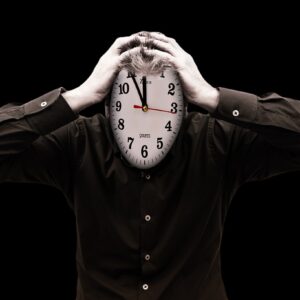
Count how many times you eat throughout the day. Not calories just how many times you eat and drink something with calories. See where that number is for 3-5 days in a row. Most are north of 7.
If you eat/drink something 7 times in a day then imagine how many times you think about eating or drinking something in a day? It’s not pretty!
Some data would suggest we spend 15-20% of our day just thinking about food.

They say we make upwards of 35,000 choices a day, according to Psychology Today.
I mean how do we even survive a day let alone so many years!? And I’d wager those 35,000 choices aren’t taking into consideration asking someone to log each calorie they consume.
Did you know most people struggling with their weight could be 1 quick step away from their wildest goals?
If your number is much higher than 4 then we have some investigative work to do.
2-3 meals daily, eat breakfast, last meal around 3-4pm, avoids late night meal/snacks, increased protein at meals, and 12-16 hours of fasting.
This seems to be a recipe for not just weight loss but successful weight maintenance.
Greater than 6 meals daily, skips breakfast, last meal late at night, high fat, sugar diet, and reduced fasting periods. This seems to be a bit more supportive of gaining weight and poor health.
The majority of people I start working with will have a number anywhere from 8-11. It doesn’t mean they’re significantly overweight or making terrible choices, but they are not happy with their current weight or health status.
That is a lot of opportunity for errors when we’re talking about food. This thing that we think about almost 250+ times a day. Why not get it to a place in our lives where we don’t have to mentally work so hard because food isn’t going anywhere? It’s a need.
Let’s try to simplify our day around food and make the healthy choice the easy choice.
While counting calories can be a helpful tool for some individuals in certain situations, there are valid reasons why someone might choose not to count calories:
- Complexity and Time-Consuming: Counting calories can be time-consuming and requires meticulous tracking of everything you eat and drink. This can be impractical for many people, especially those with busy lifestyles. Even if it is a simple app you just type your meal into. Doing that multiple times in a day for weeks eats a lot of time.
- Stress and Obsession: For some, calorie counting can lead to obsessive behaviors, anxiety, and an unhealthy relationship with food. It may trigger or exacerbate eating disorders such as anorexia or bulimia. We have to be very mindful of this and we just know there are much better ways to measure and manage our health than logging little energy morsels.
- Inaccuracy: Calorie counts on food labels and in databases can be imprecise. The actual number of calories absorbed by the body can vary based on factors such as an individual’s metabolism and the way food is prepared. With a 20% error ratio on nutrition labels and app inaccuracies it can get away from you in just a few short days/weeks.
- Nutrient Quality vs. Quantity: Focusing solely on calorie count may lead to poor dietary choices. Not all calories are created equal; the quality of the nutrients in the food matters too. It’s important to consider the nutritional value of what you eat. One must be in a caloric deficit to lose weight and maybe that is phase 1 for someone, but we need healthy foods for a healthy life. A low calorie fast food diet, while possibly keeping someone at weight maintenance will be void of many nutrients for health.
- Overlooking Hunger and Fullness Cues: Counting calories can cause people to ignore their body’s natural hunger and fullness cues. Eating when you’re hungry and stopping when you’re satisfied is often a healthier approach. It’s also a skill that most people who keep weight off master. There’s almost no way around mastering these cues.
- Sustainability: Many find it difficult to maintain a calorie-counting regimen in the long term. It can lead to a cycle of yo-yo dieting where people lose weight through calorie counting but then gain it back when they stop. There’s many success stories of people counting calories at first. Some will choose to try it and I say go for it. It isn’t for the long haul, but it can help make people aware of their eating like a budget does to their financial spending.
- Food Variety and Enjoyment: Focusing on numbers can take away from the pleasure of eating. Enjoying a variety of foods and flavors is an essential part of a healthy relationship with food. Take the joy completely out of food or exercise and you have perfectly created a recipe for disaster. The odds of sustaining it as a lifestyle become less and less. You can enjoy your favorite foods and still lose and maintain your weight.
- Life Events and Social Gatherings: Counting calories can be challenging in social situations, at family gatherings, or during special events. It may lead to isolation or avoidance of these occasions. Trying to track and control every little calorie is not realistic. What happens when you travel or aren’t in control of the food you’re served? This is where the intrinsic cues become priceless.
- Body Image Concerns: Constantly monitoring calorie intake can contribute to body image issues and self-esteem problems. We don’t need any help with this painful category. Yes, there has to be responsibility with calories and being healthy, but it doesn’t need to go to the extremes that it has gone to.
- Individual Differences: People have varying calorie needs based on factors like age, metabolism, activity level, and genetics. A one-size-fits-all approach may not be appropriate. The whole “1200” calorie diet thing is ridiculous. It’s a magical number that seems to be used/suggested for so many women and it needs to end.
It’s important to note that there’s no single approach to diet and nutrition that works for everyone. Some people find success with calorie counting, especially under the guidance of a healthcare professional, while others may benefit more from intuitive eating, mindful eating, or other dietary approaches that focus on overall health and well-being rather than strict calorie monitoring.
The key is to choose an approach that aligns with your personal goals, preferences, and values, and to consult with a healthcare provider or dietitian if you have specific dietary concerns.
I’m aware it isn’t as easy as just eating less. If it was, people wouldn’t need me in their lives. There are so many environmental and emotional reasons why this is hard for a lot of people.
It doesn’t make this any less of a truth for weight loss though.
We know that there is some good research around 2-4 meal frequencies in a day. Like anything, it is not absolute and it can be tweaked based on a person’s lifestyle and physical activity.
For someone who isn’t very active and has been struggling with their weight for a long time, this solution will take them far… maybe even to the finish line.
Of course, there are many more layers with weight loss and maintaining weight loss, but cutting out meal frequencies is something the majority of people will need to do. Minimize choice selection because the more choices the higher the risk for error and the higher the odds we can become overwhelmed.
I think people believe they need to add when in reality most need to prune.
We see it a lot at Reveal. People are so confused on what and how much to eat. If a meal is only carbs, fats and a little bit of protein you’re going to be hungry shortly after.
This has you eating many times in a day just to keep hunger at bay. And guess what happens with calories? You end up above what you need and the scale creeps north month by month.
Google the protein leverage hypothesis. A lot of great things happen when we prioritize protein.
SO STOP SNACKING & ADD PROTEIN.
Start here and see where it takes you. Then build upon that foundation. Think realistic daily movement, think about where you could get tripped up and be prepared. People think we should just envision the positive with our health journey, but it’s quite the opposite. Focusing and being aware of where we might trip up shows better success for long term goals.
“The truth is that even careful calorie calculations don’t always yield uniform results. How your body burns calories depends on a number of factors, including the type of food you eat, your body’s metabolism, and even the type of organisms living in your gut. You can eat the exact same number of calories as someone else, yet have very different outcomes when it comes to your weight.” – Dr. Fatima Cody, Obesity specialist, Harvard Medical School.
It’s almost always a delicate balance between finding things you still enjoy doing and yet still having you act in a responsible way with your health. We have to typically eat less, cut portions and have some sort of daily movement.
The good news is we don’t have to meticulously count calories, hit the gym for hours at a time to do this. Regardless of what some articles, coaches or sources may tell you. There are many ways to pick from so you can enjoy it and reach your goals.
If you want to sustain your results this will be important.
The sooner you accept the reality that you have to be more responsible with your food intake and your daily movement, the sooner you will enjoy the fruits of your labor.
In Health
- Your Coach, Matt.




